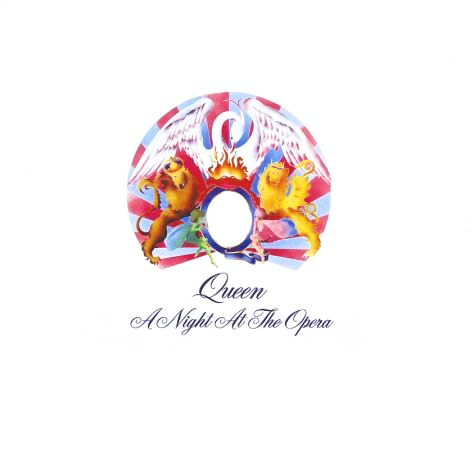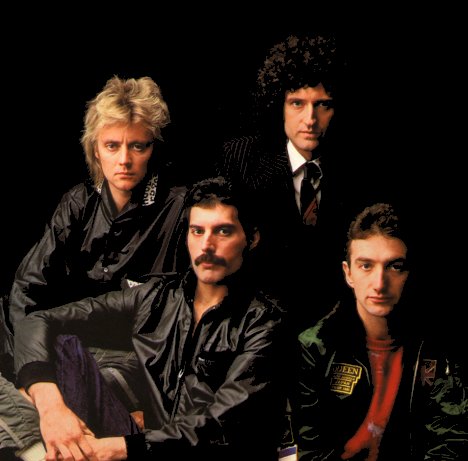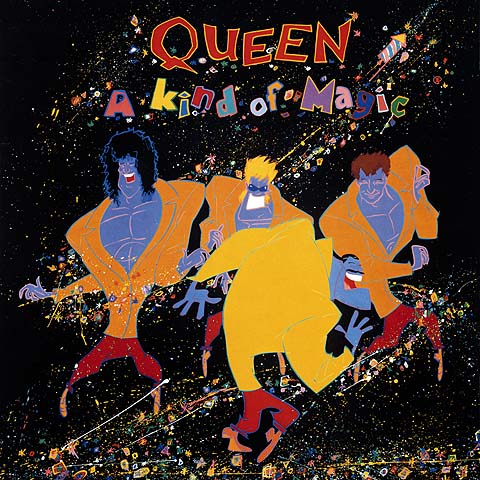04-08-1975 – Circus Magazine
Queen Swings Both Ways
by Jon Tiven
ACCOLADES SUCH AS “greatest single long-playing achievement since Sgt. Pepper” and “the most important record album ever made” fall over Queen’s latest album as easily as butter melt-ing on a hot potato — but few realize what a hot potato the album actually was in its pre-release days. It took a bevy of high-powered attorneys, some low-life finagling, and more than the usual amount of wheeler-dealing just to get the album out without its being hacked to death by defamation-of-character suits.
Guitarist Brian May explains: “I’m in real difficulty here because I’ve been threatened with libel because our old management had a good go at stop-ping the album coming out. They thought ‘Death on Two Legs’ was about them. They wanted us to take the track off and we nearly had to, and in fact they got a load of money out of our publishing company because it supposedly was libelous, but it’s never been proven. It’s all very stupid — they wanted to sue Freddie, the band, the publishing company, and the record company.”
All very dramatic stuff, but a band like Queen survives not on operatic finesse alone, but on gut-level melodramatics in the business department as well. When you produce your records, write the songs, play all the instruments, and do everything your-self, chances are you’re going to have to pay some legal dues, too. But ah! the rewards — such as the single, ‘Bohemian Rhapsody’, hanging into the No.1 spot in the British charts for seven weeks in a row!
“We’re a bit more in the public eye now, we’re starting to get recognized a lot more,” says Brian May. “We’re carrying on working just as we did before, but obviously we’re very pleased with how the record’s doing. It’s sold more than a million copies in England — I can’t believe it.” But it’s true: Queen’s stature in England has risen from that of the No.1 teenage hard rock band to that of the-group-that-made-the-single-that-every-house-wife-knows-by-heart.
What propelled Queen in that di-rection is their Night at the Opera album, a slight departure from what Queen fans know to be the Queen sound. The hard rock screams have temporarily subsided, replaced by ex-perimentation with different voicings of instruments and production tricks. Those who found Queen’s approach over-decibelled can relax to the quiet 39′ or ‘Good Company’ and tap their feet to ‘Lazing on a Sunday Afternoon’ without fear of being guitarred to death. “It’s just what came out,” says Brian. “They’re offshoots of our main direction. There’s plenty of time for the rock.”
“The album wasn’t really supposed to go in the direction that it did, it was just the songs we had. While we were making it we were thinking, ‘Yeah, it is getting a bit light,’ but rather than fight against it we de-cided to do it properly and then think again afterwards. So instead of try-ing to heavy up the lighter things, we pressed on. We had a few things we didn’t use, but we’re getting more demanding of ourselves. There are a few heavy things kicking around, but we may use them on the next record.”
The two strongest forces in Queen have always been Brian and Freddie. With A Night at the Opera, where experimentation and branching out in new directions are the most obvious characteristics, the personalities of the band are often obscured by the newly emerging elements. “Sometimes I feel that Freddie and I are going in different directions, but then he’ll come up ‘with something and I’ll think, ‘My God — we do think alike.’ When I’m working on one of his things I can tune in very easily to what guitar part he wants, and vice-versa. In terms of what we’re trying to do in songs, we are moving in different directions, but I think that could be a good thing.”
Critical response to the band is now almost unanimous-ly favorable in both Great Britain and the United States, which is quite phe-nomenal when you stop and think of how anxious many critics were to pan them two years ago. “I’m not going to take it too seriously,” Brian says, “because I remember what the critics said about Queen II.. It would seem that everybody is beginning to like us ….very much. I can take it at that level, but there’s no doubt in my mind that sometime in the future there’ll come a time when we get slagged for everything. Queen II is still my favorite of the Queen albums, certainly the most daring. Especially for the time. I think we’re still finding our feet now, and the way I feel about the new album is that we’re searching for new directions and most of them are sort of half-formed. We’ve got the Queen II feel in some places, and in others we’ve got the Sheer Heart Attack polish. I don’t think we’re quite sure where we’re going.
“This album, at the very least, negates all the comparisons to Led Zeppelin that we’ve been living with for the past three years. I think Physical Graffiti is amazing, by the way. I saw Zeppelin at Earls Court, and I met Pagey afterward, for the first time. It was great, he was very nice and gentle. I respect him a tremendous amount for ‘Kashmir’ and ‘The Light’, for being able to put his brain on record — it wouldn’t matter if he couldn’t play a note.”
Economic criticism has been less favorable, however. A Night at the Opera was widely rumored to be “the most expensive album ever made” when it was released, a point which Queen’s management denies. Nevertheless, Queen has been taken to task by quite a few English journalists for spending so much money — estimated at £30-40,000 — making one record.
Brian has a retort: “We wouldn’t have spent so much money if the studios weren’t so bloody expensive! [The album was recorded in seven of them, sometimes three at once.] We weren’t mucking about for any of it, it was four months of solid work. It came down to having the equipment available for four months, and we didn’t begrudge the amount of time spent in the studios, but it comes to a fair amount of money. There’s a lot of things that seem light, like ‘Good Company’, which actually took a great deal of time and care. All those trumpets and clarinets being fashioned from guitar sounds — I took it quite seriously because I wanted to do it right, even though it was a lighthearted thing. We worked too hard for our own health, we got a bit down and depressed.”
While Queen was laying about England between record and tour, a few of them got going on some independent projects. Brian and Roger produced an R&B group’s single, but there were some record company hassles and it may be some time before the record gets released. And on the eve of the Amer-ican tour, Freddie Mercury went into the studios with a singer/songwriter managed by the Rocket Organization (which manages Queen as well) to try his hand at production.
“Eddie Howells is the guy’s name, and he’s managed by David Mead, and they’re doing a single for Warners. I’m playing some guitar on it.” Brian restrained himself from going out on any limbs before the American tour in order to get himself physically fit. His health had been a crucial problem on an earlier American tour, and he’s not particularly anxious to spend time in hospitals when he could be onstage instead. “I actually get more tired off tour than on tour,” he admits. “But I am in good health.”
Once the English leg of the tour did get started, word started to flow very quickly back to the States about Queen’s dramatic stage show — a stage show to end all stage shows, with Mercury donning short-shorts to add a bit of the hairy leg to Queen’s otherwise pristine presentation. “The show is the same, but different,” Brian says confusedly. “We’ve merely developed what we did before with some new material from the new album. It’s a bit of reshuffling. Plus we do ‘Doing Alright’ from the first album, which we’ve never done onstage before. And ‘Seven Seas of Rhye’, which we’d do in England but never in America before. It’s quite a lot different, actually.”
American audiences got their first chance to sample the new presentation on January 27 in Waterbury, Conn., when the first concert of Queen’s scheduled 32-date, 21-city American tour got underway in the Palace Theatre. After arriving in the States at Kennedy International on January 20 and spending a couple of days in New York for interviews, Queen began five days of rehearsals at the Palace to ready their show for American fans across the country. After Waterbury they dove headfirst into the intensive six-week tour, which featured extended runs in New York, Philadelphia, and Los Angeles before its scheduled end March 12 at the San Diego Sports Arena.
Despite the novel direction of the new album, onstage Queen proved to be the same rocking outfit they’ve al-ways been, letting loose with the same kind of guitar-bass-drums-piano barrage they’ve delivered in the past. “We don’t do ’39’ or ‘Lazing on a Sunday Afternoon’ in our show,” Brian explains. He seems a bit defensive of Queen’s rock spirit, which is kept intact in the live set by ‘Bohemian Rhapsody’, ‘Sweet Lady’, ‘Prophet Song’ and the deletion of the “experimental tunes” from A Night At the Opera.
By the by, those who missed Queen on earlier tours but want to see how they’ve changed now have the means. Queen have joined the prestigious ranks of the Zeppelins, the Beatles, and the Rolling Stones whereby some illegal entrepreneur has issued a bootleg album of one of their American concerts. “I hate those things — they rarely give an accurate picture of the group,” Brian states unequivocally, and in this case he’s right. The Queen bootleg has transistor radio fidelity, and the only truly audible members of the band are Brian and Freddie. Yet the fact that a bootleg exists confirms the fact that Queen is now well on their way to the top.




